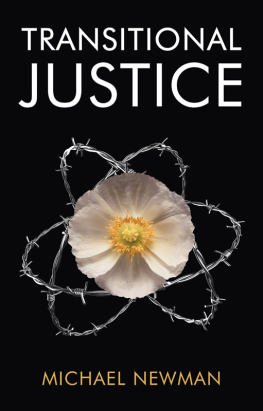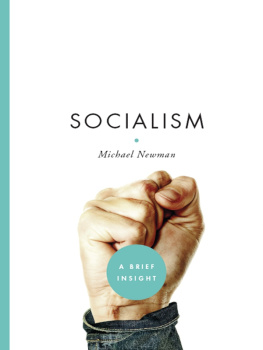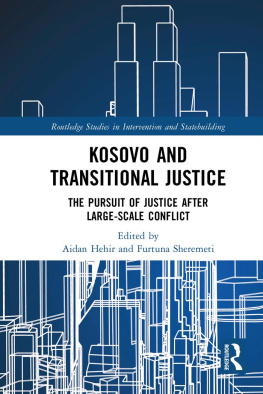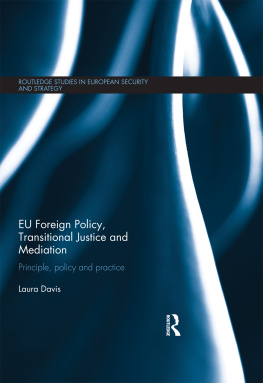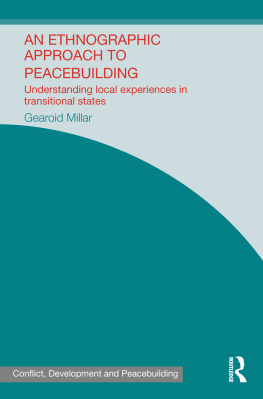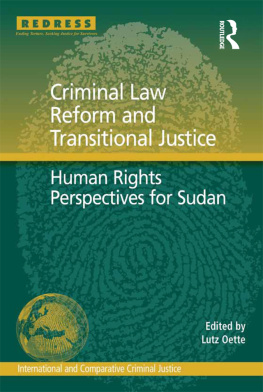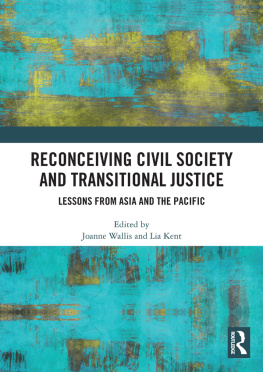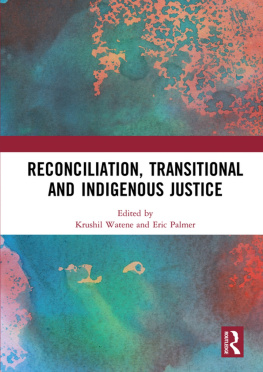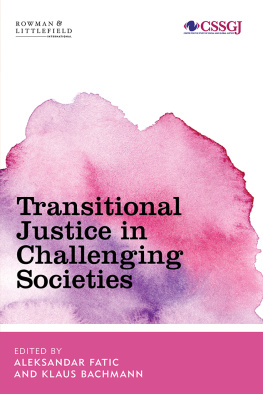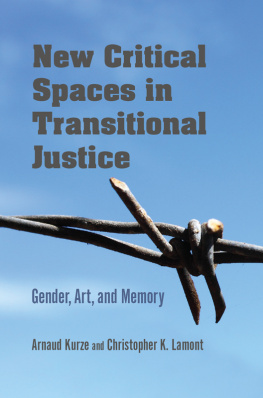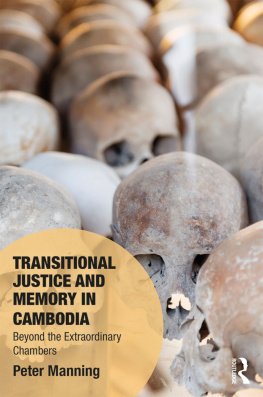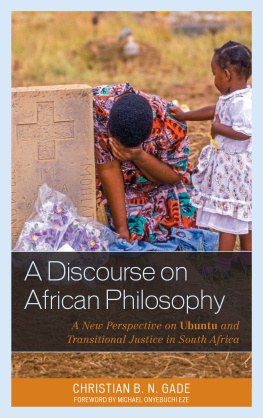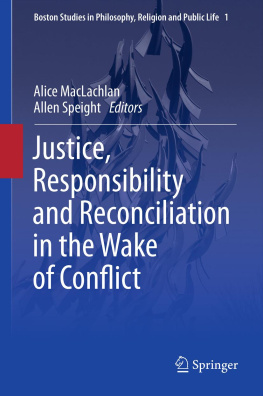
Transitional Justice
Contending with the Past
Michael Newman
polity
Copyright page
Copyright Michael Newman 2019
The right of Michael Newman to be identified as Author of this Work has been asserted in accordance with the UK Copyright, Designs and Patents Act 1988.
First published in 2019 by Polity Press
Polity Press
65 Bridge Street
Cambridge CB2 1UR, UK
Polity Press
101 Station Landing
Suite 300
Medford, MA 02155, USA
All rights reserved. Except for the quotation of short passages for the purpose of criticism and review, no part of this publication may be reproduced, stored in a retrieval system or transmitted, in any form or by any means, electronic, mechanical, photocopying, recording or otherwise, without the prior permission of the publisher.
ISBN-13: 978-1-5095-2115-9
ISBN-13: 978-1-5095-2116-6 (pb)
A catalogue record for this book is available from the British Library.
Library of Congress Cataloging-in-Publication Data
Names: Newman, Michael, 1946- author.
Title: Transitional justice : contending with the past / Michael Newman.
Description: Cambridge, UK ; Medford, MA, USA : Polity Press, [2019] | Includes bibliographical references and index.
Identifiers: LCCN 2018048567 (print) | LCCN 2018061767 (ebook) | ISBN 9781509521197 (Epub) | ISBN 9781509521159 | ISBN 9781509521166 (pb)
Subjects: LCSH: Transitional justice.
Classification: LCC K5250 (ebook) | LCC K5250 .N49 2019 (print) | DDC 340/.115--dc23
LC record available at https://lccn.loc.gov/2018048567
Typeset in 11 on 13 pt Sabon by Fakenham Prepress Solutions, Fakenham, Norfolk NR21 8NL
Printed and bound in the UK by CPI Group (UK) Ltd, Croydon
The publisher has used its best endeavours to ensure that the URLs for external websites referred to in this book are correct and active at the time of going to press. However, the publisher has no responsibility for the websites and can make no guarantee that a site will remain live or that the content is or will remain appropriate.
Every effort has been made to trace all copyright holders, but if any have been overlooked the publisher will be pleased to include any necessary credits in any subsequent reprint or edition.
For further information on Polity, visit our website: politybooks.com
Preface
What does a new regime do in the aftermath of mass atrocities committed by a brutal dictatorship? How can a society overcome the traumatic past of a violent civil war and move forward to a peaceful future? Is it possible to establish a just settlement in which past wrongs are acknowledged and addressed? These are central questions in what is now known as transitional justice (TJ), but this field is highly contested.
TJ is most frequently viewed as a set of mechanisms or tools, which typically include criminal prosecutions of perpetrators of mass human rights abuses; truth commissions to investigate exactly what happened; reparation programmes for victims and survivors; and memorials and education. When implemented singly or in combination, these often capture the attention of people who may not be familiar with the term. For example, long after its completion in 1998, the South African Truth and Reconciliation Commission remains widely familiar, and, by discussing it, those outside the TJ community quickly become engaged in debates as to whether truth commissions, trials, amnesties or other mechanisms are the most appropriate way to deal with mass abuses and violations associated with former regimes or civil wars. Such issues will be considered throughout the book, but its subtitle, Contending with the Past, in my view, highlights an element that is still more fundamental to TJ than any set of mechanisms.
Contending in this context suggests the idea of struggling to surmount something that is inherently difficult, and TJ necessarily occurs in such circumstances. After mass abuses, atrocities or other forms of injustice, it is inevitable that a transition will be problematic, for the legacy of such violations will continue far beyond the establishment of a new regime or government. Contending with the past implies a genuine struggle to overcome this legacy, and this is not at all common. Historically, many transitional regimes have remained silent about the past, and Spain is often cited as a comparatively recent example of this. In 1939 General Franco defeated republican and left-wing forces after a brutal civil war and then ruled in a dictatorship until his death in late 1975. But the new regime decided to draw a veil over the long period of violence and repression. This followed from a belief that instituting measures to bring about accountability, or even serious discussions of recent history, would make it impossible to create a stable society.
Subsequently the international climate changed, and since the 1990s there has been an increasing expectation and demand that, in the aftermath of mass abuses, new regimes or governments will introduce some of the measures associated with TJ. But contending with the past is certainly not guaranteed by the implementation of a set of mechanisms, which may be promulgated superficially or at the behest of external forces, or even cynically to divert attention from continuing injustices. Furthermore, it is quite typical for both new and existing regimes to create myths about the past as a means of legitimating a current status quo and set of prevailing attitudes. Thus, in the UK, and particularly England, history has often been used selectively and in a celebratory way, constantly harking back to the Second World War, rather than also confronting the reality of an imperial past built on violence, racism and economic pillage. Suggesting that TJ means genuinely contending with the past is therefore to set it high goals which may rarely be achieved in practice. But I take it that this objective must be an integral part of its aspirations if it is to mean more than implementing a set of tools. What, then, is the nature of this book?
One reflection of the exponential growth in the field has been the extent of academic and practitioner publications devoted to TJ. In the early years, it tended to be regarded as a branch of law, but subsequently it has been taken up by a whole range of other disciplines and subject areas most obviously, politics and international relations, but also peace and conflict studies, philosophy, sociology, anthropology and others, including history, cultural studies and education. This concise work seeks to encapsulate many of the key issues and debates in TJ, drawing on a variety of cases. It also raises fundamental questions about the nature and assumptions of conventional TJ and discusses critical approaches to the concept and practice. It is necessarily highly selective, but it seeks to provide an illustrative overview which will simultaneously open up the subject and a sense of its importance to those coming to it for the first time, while offering new insights and food for thought to those already familiar with it.
Acknowledgements
I am grateful to the staff at Polity Press, and particularly to George Owers, for so readily accepting my proposal and for his editorial suggestions throughout the process. The comments of four anonymous reviewers were very helpful, and I am pleased to acknowledge their work. I also want to thank Christine Bell for devising the phrase contending with the past as the most appropriate description of transitional justice and for supporting my use of it as the subtitle in this book. My thanks also go to Par Engstrom, Rachel Kerr, Iavor Rangelov and the late Chandra Lekha Sriram for the stimulating seminars through the London Transitional Justice Network, and to the staff at New York University in London for providing a friendly and helpful environment for teaching and research. Once again I really appreciate my brother Jeffs general interest in the book as well as his careful reading of the text. Above all, as always, I cannot thank Ines enough for her constant encouragement and support and for being such a brilliant constructive critic.
Next page
